Alison McGhee's Blog, page 7
March 26, 2016
Poem of the Week, by Mary Karr
Scrolling through a few hundred poems this morning, no poetry goal in mind, I found this one by Mary Karr. It flung me back into memories of my long-ago cat Clemens, who appeared in my life one night when we were eating salmon. He hurled himself up from the ground and clung to the screen window of our first-floor apartment, yowling. We took him in and he never l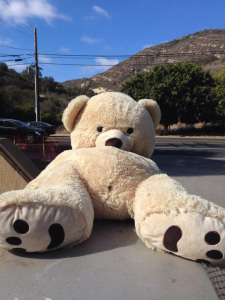 eft. Clem was born to the streets and it was not possible to keep him inside all the time. He was a street cat, a warrior, scourge of the feline neighborhood. One day I returned home to find him lying on the front lawn, near death, one eye gouged half-out, deep wounds in his tail and sides that took him weeks both in the hospital and at home to recover from. He loved running water and sometimes I let the kitchen faucet trickle just to watch him crouch in the sink, batting at it. His nickname was shui mao, which translates as water cat. He loved tall boxes just barely big enough to contain him, from which he would stare out, sure that no one could see him. When he was nine he developed diabetes. It was twice-daily insulin shots from then on, none of which slowed him down much. He died at 17, having finally become an old, slow cat. Clem was magnificent. I still miss him.
eft. Clem was born to the streets and it was not possible to keep him inside all the time. He was a street cat, a warrior, scourge of the feline neighborhood. One day I returned home to find him lying on the front lawn, near death, one eye gouged half-out, deep wounds in his tail and sides that took him weeks both in the hospital and at home to recover from. He loved running water and sometimes I let the kitchen faucet trickle just to watch him crouch in the sink, batting at it. His nickname was shui mao, which translates as water cat. He loved tall boxes just barely big enough to contain him, from which he would stare out, sure that no one could see him. When he was nine he developed diabetes. It was twice-daily insulin shots from then on, none of which slowed him down much. He died at 17, having finally become an old, slow cat. Clem was magnificent. I still miss him.
For a Dying Tomcat Who’s Relinquished His Former Hissing and Predatory Nature
– Mary Karr
I remember the long orange carp you once scooped
from the neighbor’s pond, bounding beyond
her swung broom, across summer lawns
to lay the fish on my stoop. Thanks
for that. I’m not one to whom offerings
often get made. You let me feel
how Christ might when I kneel,
weeping in the dark
over the usual maladies: love and its lack.
Only in tears do I speak
directly to him and with such
conviction. And only once you grew frail
did you finally slacken into me,
dozing against my ribs like a child.
You gave up the predatory flinch
that snapped the necks of so many
birds and slow-moving rodents.
Now your once powerful jaw
is malformed by black malignancies.
It hurts to eat. So you surrender in the way
I pray for: Lord, before my own death,
let me learn from this animal’s deep release
into my arms. Let me cease to fear
the embrace that seeks to still me.
For more information on Mary Karr, please click here.
Website
Blog
Facebook page
@alisonmcghee







March 21, 2016
“Maybe a Fox”
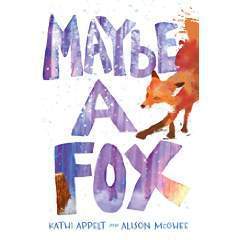 My lovely friend Kathi Appelt and I wrote a novel together, Maybe a Fox, here on Indiebound and here on Amazon, which was published last week. It began as a lark (I’ve always wanted to use that phrase, so thank you for letting me do so here), sparked by our friendship and a poem we both loved, but it took us one helluva long time to write it, as you will see if you read the below post we wrote about the process. The book has so far gotten a bunch of starred reviews, which makes us happy, given that at a few points we were close to throwing in the towel (on the book, not our friendship).
My lovely friend Kathi Appelt and I wrote a novel together, Maybe a Fox, here on Indiebound and here on Amazon, which was published last week. It began as a lark (I’ve always wanted to use that phrase, so thank you for letting me do so here), sparked by our friendship and a poem we both loved, but it took us one helluva long time to write it, as you will see if you read the below post we wrote about the process. The book has so far gotten a bunch of starred reviews, which makes us happy, given that at a few points we were close to throwing in the towel (on the book, not our friendship).
Maybe a Fox has also just been published in audio form. For better and for worse, I did the recording. Click here for a sample of the audio version. Recording a book on audio is weird and fascinating. The booth is silent and you have to sit perfectly still. You have to physically place your hands where you want them before you say a word, for example, because the sound mics are so sensitive that the tiny touch of your finger on your jeans will sound like wind. You can see the producer and the sound engineer beyond the soundproof window, chatting and drinking coffee and eating malted milk balls, but everything’s silent where you are. This was such a cool experience.
How in the world do you write a novel with another person? Kathi and I just jumped in and figured it out as we went along (and along and along and along and along).
The collaboration that would become Maybe a Fox began many years ago in a freezing and dingy dorm at Vermont College of Fine Arts, where we were new both to the faculty and to each other. Alison’s roller bag had gone missing at the airport, and she remembers Kathi tilting her head in sympathy and offering, in that beautiful Texas accent of hers, to lend her a pair of pajamas. Kathi doesn’t remember that, but she does remember breakfast the next day, when the two of us loaded up our trays and scuttled to sit together at a small table between two huge pillars in the drafty dining hall, a table we sat at every day, three times a day, for each of the residencies we shared.
It was friend-love at first sight, and it was that very first week, when we were eating one of the many meals we ate together Between the Pillars, that Kathi suggested we write a book together.
“What kind of book?” Alison said.
“A book about two sisters,” Kathi answered.
Both of us had many other projects that occupied us, and the idea was tabled, although one of us would occasionally bring it up over the years. Then, about five years ago, Alison sent out a poem about a small red fox in snow as her Poem of the Week. Something about that little fox ignited both of us, and we decided to take the plunge and begin our book.
The ground rules:
The book would be about two sisters who were somehow separated, and it would also contain a small red fox.
Each of us would take on a new challenge in the writing, something she’d never done before as a writer.
We would each write in a separate viewpoint, with chapters alternating between those viewpoints.
After considering the sister possibilities –twins separated at birth? Sisters each living with one parent? One sister in prison and the other not? One sister alive and the other not?—we left it vague. Sisters, separated somehow. We figured the fox would appear on its own terms, when the time was right, so we didn’t worry about that. As for the personal writing challenge, Kathi decided to write in first person, since she hadn’t before, and Alison decided to write in the voice of the fox, since up until then she’d stayed strictly with humans.
We began the book by trading chapters weekly, sometimes more often if the muse struck. We worked wildly fast, most of the time, and the story gathered ground and impetus week by week. Kathi was fascinated by the fact that some rare rivers disappear underground. Alison was fascinated by the idea of an animal that could sense things from a world beyond this one. We tossed ideas back and forth, tried them out week by week, abandoned them if they were dead ends, followed them as far as we could if they felt powerful.
Eventually we realized that we were writing a book about maybes, about the way we as human beings try to answer unanswerable questions –what happens when we die? What happens with grief too big to stand? What happens when you can’t find the answers to what you most need to know?—and that sense, of both possibility and heartbroken wonder, became the core of the novel.
We wrote an entire, unwieldy mess of a draft in half a year. With the ongoing help of our wonderful agent and the massive efforts of our beloved editor Caitlyn Dlouhy, we rewrote that mess of a draft countless (literally, we have no idea at this point how many times we rewrote that book) times over the next four years. What began as an alternating-chapter, alternating-point of view method turned into a we’ll-work-on-the-whole-thing-together method. Where Alison once was the sole writer of the fox chapters, and Kathi the sole writer of the Jules chapters, we can no longer point to any voice or passage or chapter as belonging to either of us. We moved from emailed chapters to simultaneous Google doc revisions to taking turns separately revising the entire book (over and over).
At one point early on, Kathi flew up from Texas and we sat on Alison’s porch in Minneapolis and took turns reading chapters out loud to each other, pencils in hands, marking up places to revise. We laughed. We cried. We talked through every aspect of plot and character. We never once, strangely enough, argued. Kathi flew back to Texas and the rewrites continued for another three years. At some point along the way we began sending each other fox totems: a fox necklace, a framed fox photograph, a felt basket with a fox on it, fox notecards. Alison now sees foxes wherever she goes; like the characters in Maybe a Fox, she considers them good luck.
Maybe a Fox is so much a part of our hearts and souls at this point that we privately admit to each other we have no idea if it’s any good or not; it just is. We do know that we still, each of us, cry when we read the ending. Just like Jules and Sylvie in Maybe a Fox, we consider ourselves sisters. Sister Kathi, Sister Alison. Our book is made out of wonder and longing and struggle and love. We hope it finds a good place in the world.







March 20, 2016
Poem of the Week, by Jim Daniels
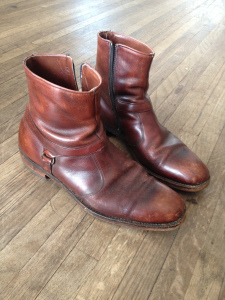 Those boots over there were sitting amongst the rundown running shoes and loafers and wingtips on a display rack of men’s shoes at Experienced Goods in Brattleboro, Vermont a few years ago. They were $8. It was clear that they were at least an inch too long for me, but because they were narrow I tried them on anyway and they fit as if someone had poured liquid leather around my feet and ankles and it magically turned into boots. I took them to an old-school cobbler to be resoled.
Those boots over there were sitting amongst the rundown running shoes and loafers and wingtips on a display rack of men’s shoes at Experienced Goods in Brattleboro, Vermont a few years ago. They were $8. It was clear that they were at least an inch too long for me, but because they were narrow I tried them on anyway and they fit as if someone had poured liquid leather around my feet and ankles and it magically turned into boots. I took them to an old-school cobbler to be resoled.
“Can you tell me what brand these are?” I said. “Because I need to buy only this brand for the rest of my life.”
He smiled.
“You can’t buy this brand,” the cobbler said. “There is no brand. These boots are probably thirty years old. They were handmade in Italy.”
Leather boots, steel toe boots especially, are one of the few things left in the world that can’t be rushed. They can’t be stonewashed or bleached or chemically altered in order to save time, because what boots need to fit right is exactly that: time. This poem reminds me of that fact.
Work Boots: Still Life
– Jim Daniels
Next to the screen door
work boots dry in the sun.
Salt lines map the leather
and laces droop
like the arms of a new-hire
waiting to punch out.
The shoe hangs open like the sigh
of someone too tired to speak
a mouth that can almost breathe.
A tear in the leather reveals
a shiny steel toe
a glimpse of the promise of safety
the promise of steel and the years to come.
For more information on Jim Daniels, please click here.
My website
Blog
Facebook page
@alisonmcghee







March 12, 2016
Poem of the Week, by Leah Falk
See that bird below? I’ve been watching him sing his heart out for hours now, here at the Austin, TX airport, where we have both taken up residence, me for the better part of 24 hours and him for who knows how long. A combination of overbooked flights, rebooked flights, unbooked flights and the chaos of the SXSW music festival have given me the opportunity to get to know this airport well, although probably not as well as this bird. I wander from one end of the terminal to another, listening to live music, eating pretzel bits offered up by the Auntie Anne’s server, talking to the Earl Campbell Sports Bar waiter who recognized me this morning from dinner last night, and listening to the bird. He might not be singing so much as wailing, and who can blame him? He made me think of this beautiful poem by Leah Falk. A torn page in the book of animals.

Noah, to His Dove
– Leah Falk
With your wings of paper, fly, my bird, and find
a man who stands in water. In this land,
even far from shore, the brows of waves might break
against a sandy table, glass moon lit
to guide them toward last call, their salty end.
To the man who holds that trembling room
together with his feet—who holds his heart
against erosion—give your gentle body,
its crisp folds, its fragile case, its ink
as sweet as liquor. If he reads you over
and again, build us a house upon his rocky breast,
gather clay and willow. Until then, when I come
to your torn page in the book of animals,
my own heart stills and digs a trench that fills with rain.
For more information on Leah Falk, please click here.
My website.
Twitter: @alisonmcghee







March 5, 2016
Poem of the Week, by Alden Nowlan
 When I was a kid, the school bus I rode back and forth to school was a horror show of cruelty perpetrated by bullies who were aided and abetted by the bus driver. Every four years I pretend to be British (a six-week election campaign! silence until September!) but it’s not working. Being bullied, watching others be bullied, staying silent about the crime of bullying, watching the as-yet-unbullied align themselves nervously behind the bullies with the goal of not being bullied themselves are all part of the same putrid bully swamp. A poem about someone rejecting the surround-sound meanness, even covertly, even though he’s scared, can act as partial antidote to the poison. Poem of the week, by Alden Nowlan.
When I was a kid, the school bus I rode back and forth to school was a horror show of cruelty perpetrated by bullies who were aided and abetted by the bus driver. Every four years I pretend to be British (a six-week election campaign! silence until September!) but it’s not working. Being bullied, watching others be bullied, staying silent about the crime of bullying, watching the as-yet-unbullied align themselves nervously behind the bullies with the goal of not being bullied themselves are all part of the same putrid bully swamp. A poem about someone rejecting the surround-sound meanness, even covertly, even though he’s scared, can act as partial antidote to the poison. Poem of the week, by Alden Nowlan.
Flossie at School
– Alden Nowlan
Five laths in a cotton dress
was christened Flossie
and learned how to cry,
her eyes like wet daisies
behind thick glasses.
She was six grades ahead of me
and wore bangs; the big boys
called her “The Martian,”
they snowballed her home,
splashed her with their bicycles,
left horse dung in her coat pockets.
She jerked when anyone spoke to her,
and when I was ten
I caught up with her one day
on the way home from school,
and said, Flossie I really like you
but don’t let the other kids know I told you,
they’d pick on me, but I do like you,
I really do, but don’t tell anybody.
And afterwards I was ashamed
for crying when she cried.
For more about Alden Nowlan, click here.
My website.
My Facebook page.







March 3, 2016
Bookstore visits, March 7-10

Greetings, anyone and everyone who lives within driving distance of the below bookshops! My lovely, funny, talented friend and novel-writing collaborator Kathi Appelt and I are embarking on a whirlwind tour next week, visiting bookstores to read from Maybe a Fox and chitchat with y’all (I’m channeling Kathi’s Texas drawl, can you tell?) about books and reading and your favorite cocktail (kidding) (but not really – I’m always on the lookout for a tasty new cocktail).
Maybe a Fox has gotten a bunch of starred reviews and great press and those who’ve read advance copies seem to be fans. It’s a book about two sisters, one of them gone forever, and how their lives intertwine with a baby girl fox. Set in Vermont, in the woods by a rushing river, it’s also a story about grief, memory, love, hope and wonderment. We would LOVE to see you next week if you’re around. We’ll also be appearing in Los Angeles (both of us), Texas again (Kathi) and Dubai (Alison) next month, so check for updates if you’re interested.
Monday, March 7—Milwaukee, WI
Oak Creek Public Library—6:30 p.m.
Tuesday, March 8—Naperville, IL
Anderson’s Bookshop—6:00 p.m.
Wednesday, March 9—Houston, TX
Blue Willow Bookshop—5 p.m.
Thursday, March 10—College Station, TX
Jacque’s Toys and Books—5:30 p.m.
Saturday, March 20–Tustin, CA (Alison only)
Once Upon a Storybook, 11 a.m.
Hope to see you there!







Poem of the Week, by Nayyirah Waheed
 poem, from Salt
poem, from Salt
– Nayyirah Waheed
you broke the ocean in
half to be here
only to find nothing that wants you
For more information on Nayyirah Waheed, please click here.
My website.







February 21, 2016
Poem of the Week, by Ruth Foley

Last week a friend of mine died, a fellow writer and colleague I worked alongside for many years. The outpouring of grief on our listserv was unprecedented, even though her death wasn’t unexpected – she had struggled for years with kidney disease and, at the end, cancer. Beyond that, Donna lived and coped with severe bipolarity and the side effects of its treatment for her entire adulthood. Life gave her few breaks, but she lived with such devotion and profound kindness toward everyone she encountered. The day she died, I went for an hours-long hike in the canyons to think about her in silence. Her greatest gift, to me, was the gift of time, and by that I mean her undivided attention. When Donna was talking with you, there were no distractions, and she took as much time as was necessary (which is probably why she was often late.) I have spent days trying to think of the right poem to send out in her honor. This one kept coming back, maybe because, in the face of her illnesses, she kept having to reconfigure and recalibrate and reconsider her life. And she did it with such grace.
The Cracking Place
– Ruth Foley
Here’s the new rule: Break the wineglass
and fall towards the glassblower’s breath.
—Rumi
If the old rule was to fight the shattering,
or to cry over the milk puddling across
the table and to the floor, become instead
the milk. Seek the table edge and come
to an agreement: without me, there is
no you. When I fall, you cease to matter.
So you are no longer contained, except
within your own arced boundaries.
If the old rule was to loose the slowly
straining curve, wonder in the patience
of cooperating with the air. Give yourself
to the waft of a lazy fan and you will
find your own edges shrinking as your
helplessness dries. The table will be
big enough once you stop fearing
the brink. Once you determine your own
thirst, and choose not to drink. After all,
it was the thirst that got you here, not
the breaking. Not the fall. When we get
what we wanted, we begin again. Find
the cracking place. Find the thin veneer.
Remember that the edge cannot exist
without your teetering flutter. Make
your pact. Break the glass. Break another.
For more information about Ruth Foley, please click here.
My Facebook page.
February 13, 2016
Poem of the Week, by Rachel Richardson
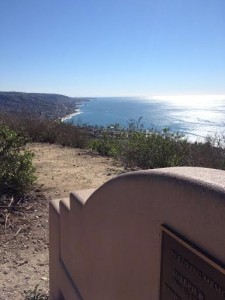 The book I’m working on, a book that has obsessed me for a year now, is about a young woman whose mother is disappearing. The young woman lives alone in a tiny cabin on a hill in the woods, and late at night she sits on her porch and tries to remember everything she can about her mother, and about their life together. This haunting poem makes me feel the way I feel when I’m working on this book. It makes me feel the way I felt the whole way through All the Light We Cannot See, a gorgeous novel which won last year’s Pulitzer Prize for fiction. It makes me remember how it felt when someone I loved told me he was thinking of ending it all, and then did. It makes me feel both helpless –what can I do? How can I help? Someone out there is in great danger– and comforted, because to feel alone but know that others are also alone in the same way is to be, in a strange and silent way, less alone.
The book I’m working on, a book that has obsessed me for a year now, is about a young woman whose mother is disappearing. The young woman lives alone in a tiny cabin on a hill in the woods, and late at night she sits on her porch and tries to remember everything she can about her mother, and about their life together. This haunting poem makes me feel the way I feel when I’m working on this book. It makes me feel the way I felt the whole way through All the Light We Cannot See, a gorgeous novel which won last year’s Pulitzer Prize for fiction. It makes me remember how it felt when someone I loved told me he was thinking of ending it all, and then did. It makes me feel both helpless –what can I do? How can I help? Someone out there is in great danger– and comforted, because to feel alone but know that others are also alone in the same way is to be, in a strange and silent way, less alone.
Transmission
– Rachel Richardson
There was a girl who heard it happen:
Amelia Earhart calling
on the radio, she and her navigator
alternately cursing and defining their position
by latitude, as best they could read it
in the bellowing wind, and by what
they could surmise of their rate per hour
last land they’d seen. Stay with me, someone,
and the girl wrote each word
in her composition book, kept the channel
tuned, hunched to the receiver
when static overtook the line.
Why do I think of her?
The coast guard laughed at her father
holding out the schoolgirl scrawl
and sent him home ashamed. A lost woman
is a lost woman, he told her, and the sea
is dark and wide.
For more information on Rachel Richardson, please click here.
My Facebook page.
February 7, 2016
Poem of the Week, by Nayyirah Waheed
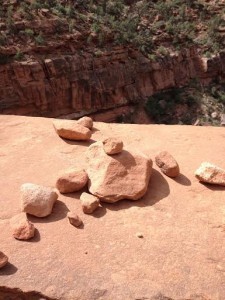 Ever since I moved to a big city after college, I have walked past homeless people. On the sidewalks, in the subway, in doorways, huddled inside cardboard box shelters. My best friend and I used to agonize over it. Yes, I have a quarter, I remember her saying when we were 22 and new to it. But what good is a quarter going to do? Mental illness, overwhelming poverty, addiction. We felt helpless. I still feel helpless. Donations to shelters and mental health alliances, stints volunteering at Habitat, none of it feels tangible.
Ever since I moved to a big city after college, I have walked past homeless people. On the sidewalks, in the subway, in doorways, huddled inside cardboard box shelters. My best friend and I used to agonize over it. Yes, I have a quarter, I remember her saying when we were 22 and new to it. But what good is a quarter going to do? Mental illness, overwhelming poverty, addiction. We felt helpless. I still feel helpless. Donations to shelters and mental health alliances, stints volunteering at Habitat, none of it feels tangible.
Last week a homeless woman sat without speaking or moving on the grass between a busy four-lane street and the ocean. She was large. She had only one leg. Her pants were halfway off. A knapsack was next to her. Clumps of tourists and solo villagers like me walked past her. About fifty yards down the boardwalk, torment set in. You have to do something. You have to call 911. You have to call a shelter. No. You have to go back and sit down next to her and talk to her and ask her what you can do to help. So I did. But when I returned, not five minutes later, she was gone.
poem, from Salt
– Nayyirah Waheed
you broke the ocean in
half to be here
only to find nothing that wants you
For more information on Nayyirah Waheed, please click here.



